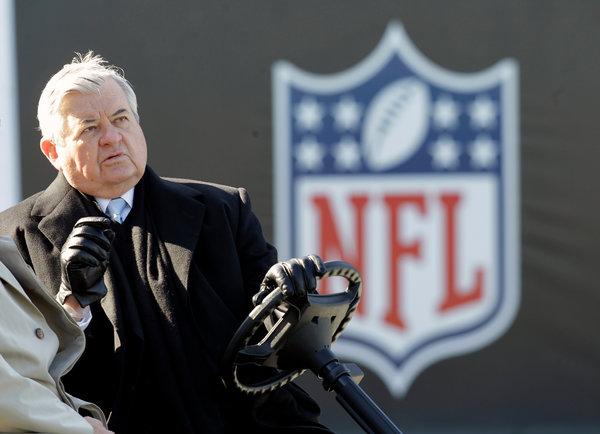Without Disclosing Details, N.F.L. Fines Jerry Richardson for Sexual Harassment and Racist Comments
By Victor Mather and Ken Belson
- June 28, 2018
Jerry Richardson, the owner of the Carolina Panthers who is in the process of selling the team, was fined $2.75 million by the N.F.L. after an investigation confirmed claims that for years he sexually harassed employees and made racist comments.
In a concise news release that did not reveal details of the investigation’s findings, the league said that the inquiry — led by Mary Jo White, a former United States attorney — “did substantiate the claims that have been made and identified no information that would either discredit the claims made or that would undermine the veracity of the employees who have made those claims.”
Richardson’s workplace behavior was first exposed by Sports Illustrated in December. Shortly after the league announced it would investigate, Richardson, 81, said that he planned to sell the team, and he stepped down from participating in day-to-day operations. The team is being sold to David Tepper, a hedge fund manager, for $2.2 billion, and the sale is expected to be completed in the coming weeks.
Several news media reports said that Richardson had used sexually suggestive language and racial slurs. He was also accused of frequently commenting on women’s appearances. The league’s statement said the investigation had determined that the inappropriate conduct in the Panthers organization was limited to Richardson.
The N.F.L.’s decision to avoid stating in detail the allegations against Richardson may have spared him some embarrassment. But the league, which has been criticized for not being direct enough in confronting perpetrators of sexual harassment and domestic violence, should have detailed the allegations to send a message to others in the league, according to Judy Harris Kluger, the executive director of Sanctuary for Families, a group that helps victims of domestic violence.
“If you really want to take responsibility, you have to go out there and say what happened,” said Kluger, who advised the league several years ago on how teams could improve the way they dealt with cases of domestic violence. “It may have been a missed opportunity, to say this person is accountable, and they are putting in place the proper remedies.”
The report also recommended that the N.F.L. bar nondisclosure agreements that limit reporting of personal conduct violations. News media accounts said that the Panthers had reached settlements with several employees over Richardson’s behavior and that the settlements had included nondisclosure agreements.
The use of these agreements is a common technique by people in power to silence accusers, said Kluger, a former sex crimes prosecutor, and they ultimately prevent a full reckoning of what occurred. It was unclear whether the N.F.L. exerted any pressure on Panthers officials to release the women from those agreements to enable them to speak freely.
The league said the money from the fine would go to groups that focus on race- and gender-based issues, including Beauty for Ashes Ministry, a religious group that supports victims of domestic abuse and sexual assault; the Black Women’s Blueprint; and the Women of Color Network.
Kristin Smith Shrimplin, the chief executive of Women Helping Women, a group that helps victims of domestic violence in the Cincinnati area, said she was encouraged that the league had earmarked some of the $2.75 million to these groups.
But like Kluger, she said the N.F.L. did not go far enough in spelling out precisely what had occurred to help prevent these types of situations in the future.
“When there is racism, name the action as racist,” she said in an email. “When there are actions of sexual harassment or any form of gender-based violence (sexual harassment, dating violence, sexual assault, domestic violence, stalking) — then name the action as such. To simply frame in P.R. communications an issue as ‘improper workplace conduct’ seems to soften the issue and generalize it too much.”
Richardson is the only former N.F.L. player in the league’s ownership fraternity. He has served on many of the influential owners’ committees, and he played a role in ending the N.F.L. lockout in 2011.
